UK Accounting Pensions: Trustee Roles and the Impact on Governance
VerifiedAdded on 2023/06/03
|18
|4233
|286
Report
AI Summary
This research report provides an in-depth analysis of accounting pension schemes in the UK, emphasizing the crucial role of trustees in pension fund governance. It explores the background of UK's pension system, highlighting its unique position compared to other European nations. The study investigates the duties and powers of trustees, including their responsibilities to act according to trust deeds, prudently, impartially, and in the best interests of beneficiaries. Furthermore, the report reviews the significance of proper pension plan governance, its implications for UK pension schemes, and potential improvements through regulatory concentration and enhanced trustee education. The research methodology section outlines the research design, paradigm, approach, data collection method, sampling technique, and ethical considerations, providing a comprehensive overview of the study's framework. Desklib offers this report as a resource for students, alongside a wealth of other academic materials.
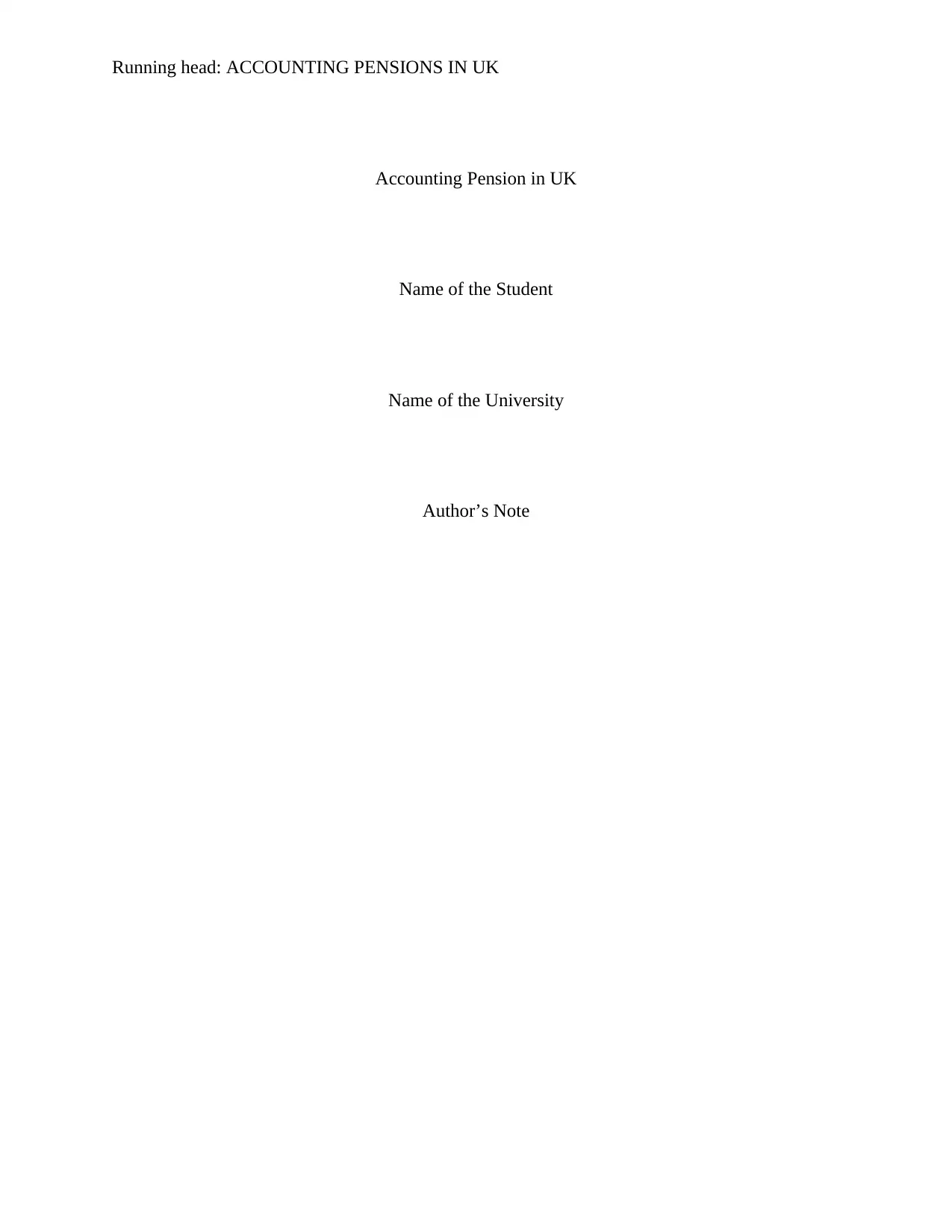
Running head: ACCOUNTING PENSIONS IN UK
Accounting Pension in UK
Name of the Student
Name of the University
Author’s Note
Accounting Pension in UK
Name of the Student
Name of the University
Author’s Note
Paraphrase This Document
Need a fresh take? Get an instant paraphrase of this document with our AI Paraphraser
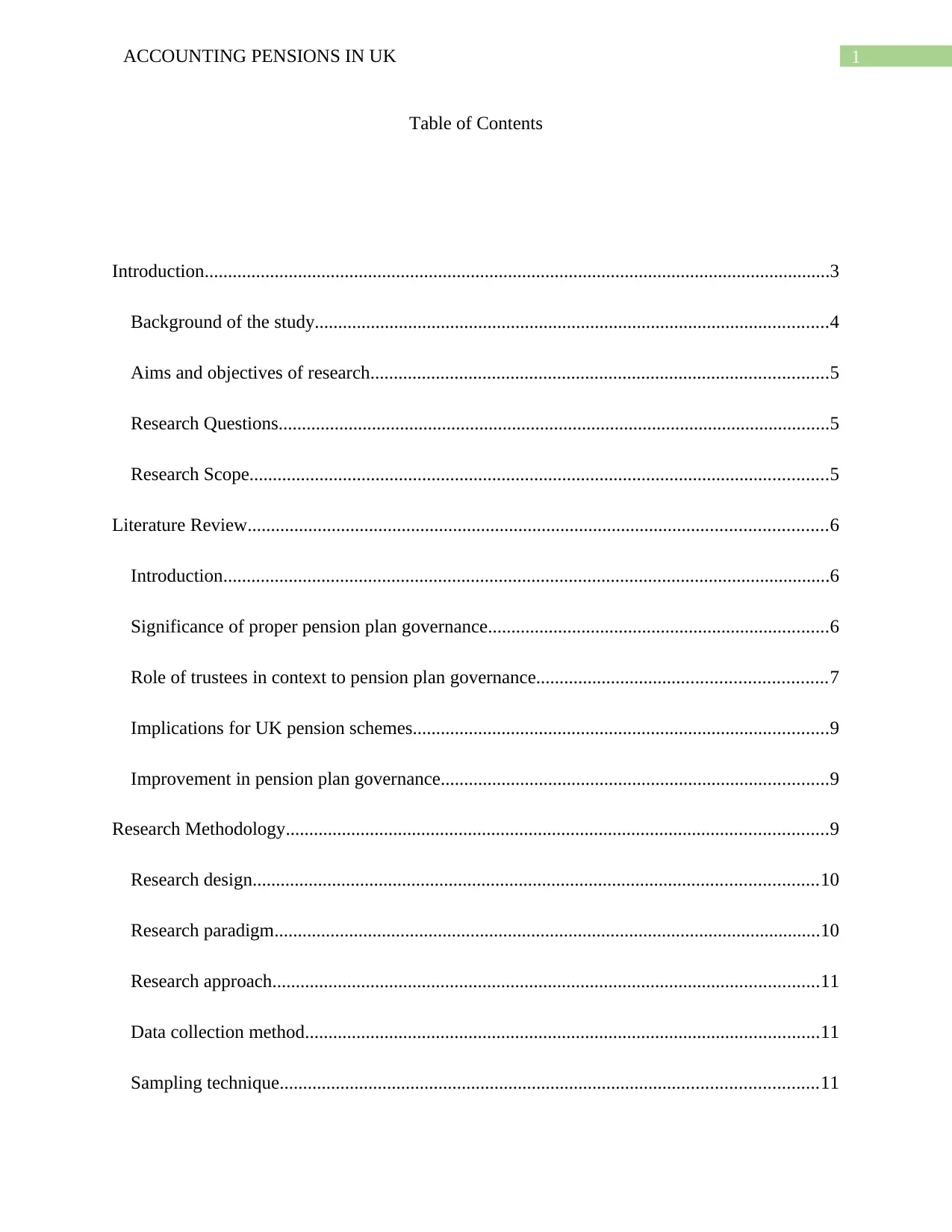
1ACCOUNTING PENSIONS IN UK
Table of Contents
Introduction......................................................................................................................................3
Background of the study..............................................................................................................4
Aims and objectives of research..................................................................................................5
Research Questions......................................................................................................................5
Research Scope............................................................................................................................5
Literature Review............................................................................................................................6
Introduction..................................................................................................................................6
Significance of proper pension plan governance.........................................................................6
Role of trustees in context to pension plan governance..............................................................7
Implications for UK pension schemes.........................................................................................9
Improvement in pension plan governance...................................................................................9
Research Methodology....................................................................................................................9
Research design.........................................................................................................................10
Research paradigm.....................................................................................................................10
Research approach.....................................................................................................................11
Data collection method..............................................................................................................11
Sampling technique...................................................................................................................11
Table of Contents
Introduction......................................................................................................................................3
Background of the study..............................................................................................................4
Aims and objectives of research..................................................................................................5
Research Questions......................................................................................................................5
Research Scope............................................................................................................................5
Literature Review............................................................................................................................6
Introduction..................................................................................................................................6
Significance of proper pension plan governance.........................................................................6
Role of trustees in context to pension plan governance..............................................................7
Implications for UK pension schemes.........................................................................................9
Improvement in pension plan governance...................................................................................9
Research Methodology....................................................................................................................9
Research design.........................................................................................................................10
Research paradigm.....................................................................................................................10
Research approach.....................................................................................................................11
Data collection method..............................................................................................................11
Sampling technique...................................................................................................................11
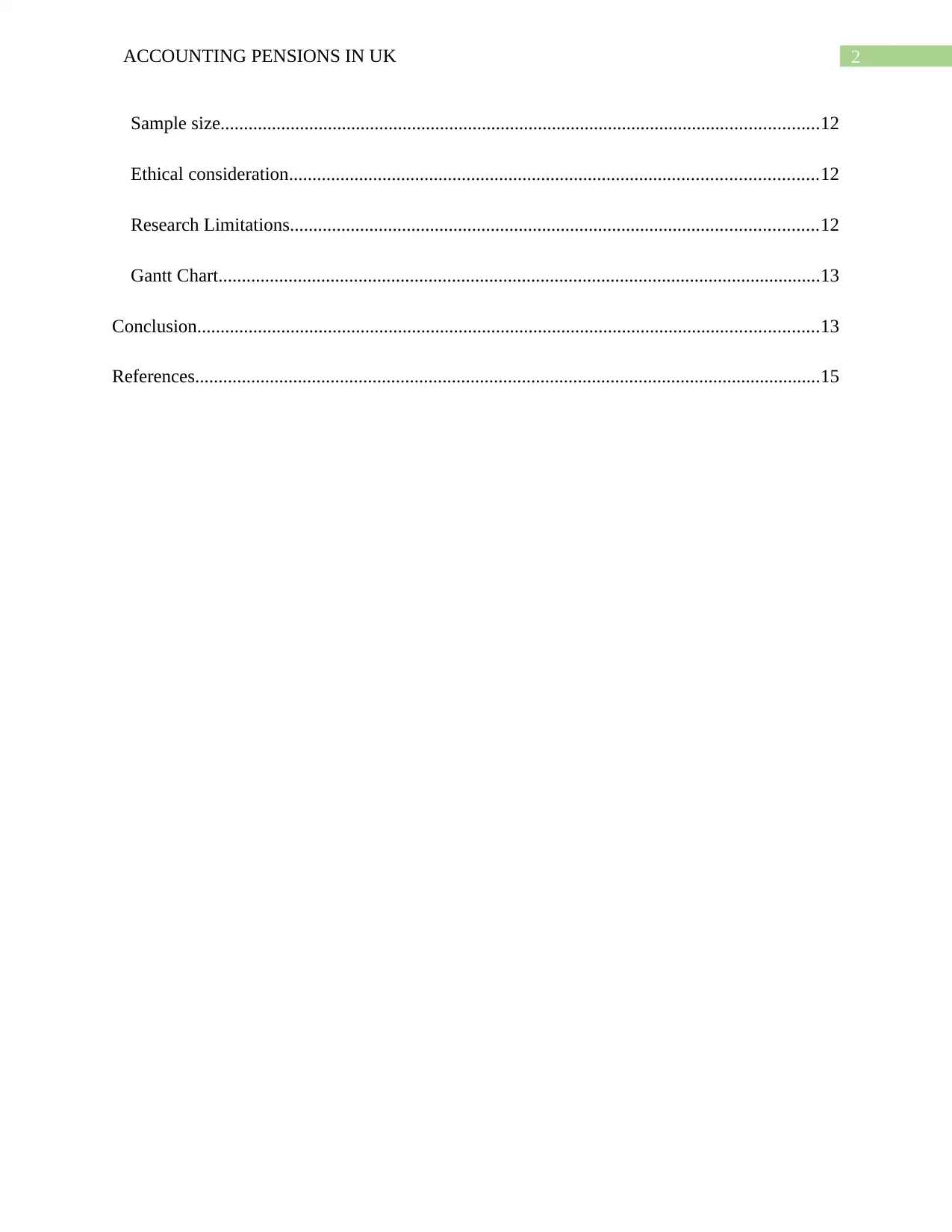
2ACCOUNTING PENSIONS IN UK
Sample size................................................................................................................................12
Ethical consideration.................................................................................................................12
Research Limitations.................................................................................................................12
Gantt Chart.................................................................................................................................13
Conclusion.....................................................................................................................................13
References......................................................................................................................................15
Sample size................................................................................................................................12
Ethical consideration.................................................................................................................12
Research Limitations.................................................................................................................12
Gantt Chart.................................................................................................................................13
Conclusion.....................................................................................................................................13
References......................................................................................................................................15
⊘ This is a preview!⊘
Do you want full access?
Subscribe today to unlock all pages.

Trusted by 1+ million students worldwide
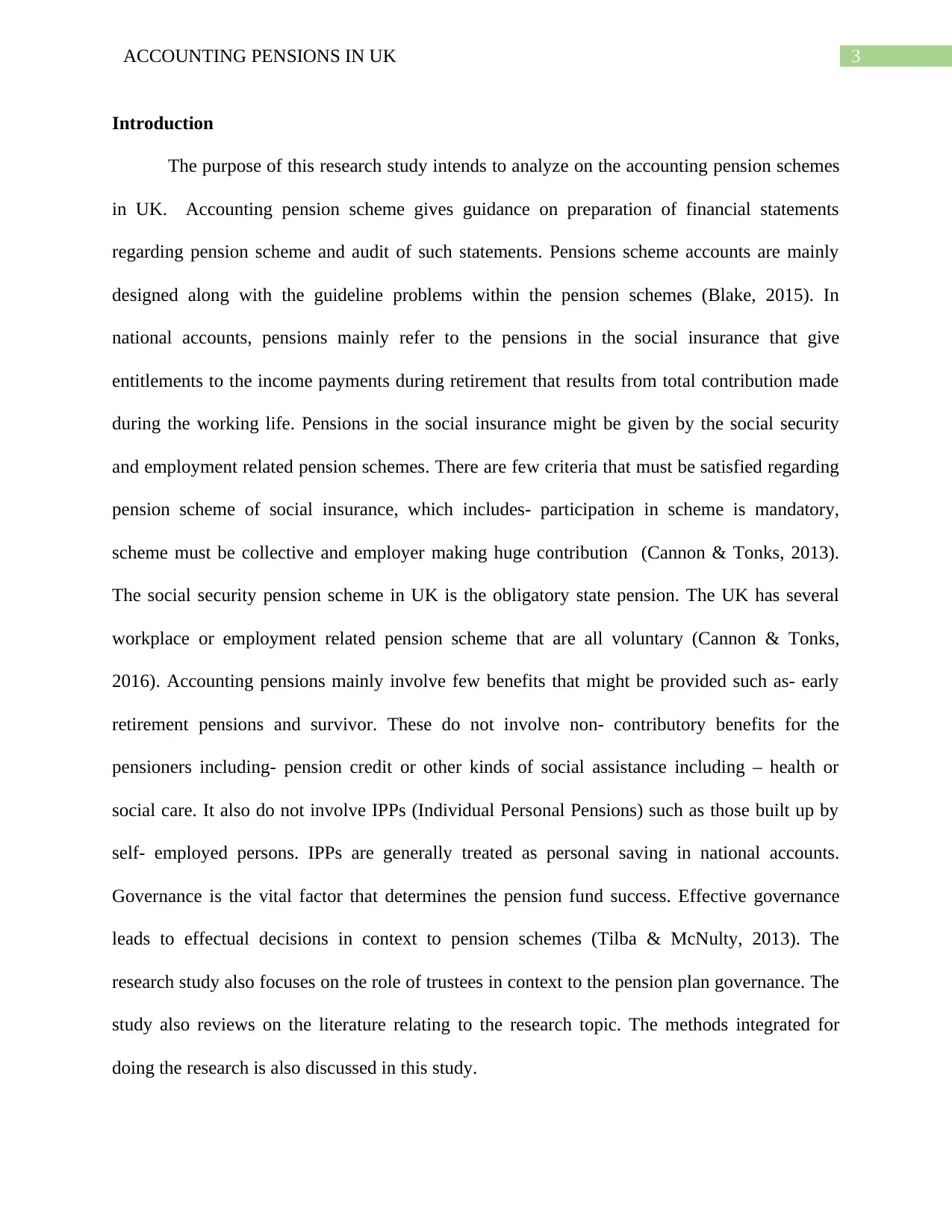
3ACCOUNTING PENSIONS IN UK
Introduction
The purpose of this research study intends to analyze on the accounting pension schemes
in UK. Accounting pension scheme gives guidance on preparation of financial statements
regarding pension scheme and audit of such statements. Pensions scheme accounts are mainly
designed along with the guideline problems within the pension schemes (Blake, 2015). In
national accounts, pensions mainly refer to the pensions in the social insurance that give
entitlements to the income payments during retirement that results from total contribution made
during the working life. Pensions in the social insurance might be given by the social security
and employment related pension schemes. There are few criteria that must be satisfied regarding
pension scheme of social insurance, which includes- participation in scheme is mandatory,
scheme must be collective and employer making huge contribution (Cannon & Tonks, 2013).
The social security pension scheme in UK is the obligatory state pension. The UK has several
workplace or employment related pension scheme that are all voluntary (Cannon & Tonks,
2016). Accounting pensions mainly involve few benefits that might be provided such as- early
retirement pensions and survivor. These do not involve non- contributory benefits for the
pensioners including- pension credit or other kinds of social assistance including – health or
social care. It also do not involve IPPs (Individual Personal Pensions) such as those built up by
self- employed persons. IPPs are generally treated as personal saving in national accounts.
Governance is the vital factor that determines the pension fund success. Effective governance
leads to effectual decisions in context to pension schemes (Tilba & McNulty, 2013). The
research study also focuses on the role of trustees in context to the pension plan governance. The
study also reviews on the literature relating to the research topic. The methods integrated for
doing the research is also discussed in this study.
Introduction
The purpose of this research study intends to analyze on the accounting pension schemes
in UK. Accounting pension scheme gives guidance on preparation of financial statements
regarding pension scheme and audit of such statements. Pensions scheme accounts are mainly
designed along with the guideline problems within the pension schemes (Blake, 2015). In
national accounts, pensions mainly refer to the pensions in the social insurance that give
entitlements to the income payments during retirement that results from total contribution made
during the working life. Pensions in the social insurance might be given by the social security
and employment related pension schemes. There are few criteria that must be satisfied regarding
pension scheme of social insurance, which includes- participation in scheme is mandatory,
scheme must be collective and employer making huge contribution (Cannon & Tonks, 2013).
The social security pension scheme in UK is the obligatory state pension. The UK has several
workplace or employment related pension scheme that are all voluntary (Cannon & Tonks,
2016). Accounting pensions mainly involve few benefits that might be provided such as- early
retirement pensions and survivor. These do not involve non- contributory benefits for the
pensioners including- pension credit or other kinds of social assistance including – health or
social care. It also do not involve IPPs (Individual Personal Pensions) such as those built up by
self- employed persons. IPPs are generally treated as personal saving in national accounts.
Governance is the vital factor that determines the pension fund success. Effective governance
leads to effectual decisions in context to pension schemes (Tilba & McNulty, 2013). The
research study also focuses on the role of trustees in context to the pension plan governance. The
study also reviews on the literature relating to the research topic. The methods integrated for
doing the research is also discussed in this study.
Paraphrase This Document
Need a fresh take? Get an instant paraphrase of this document with our AI Paraphraser
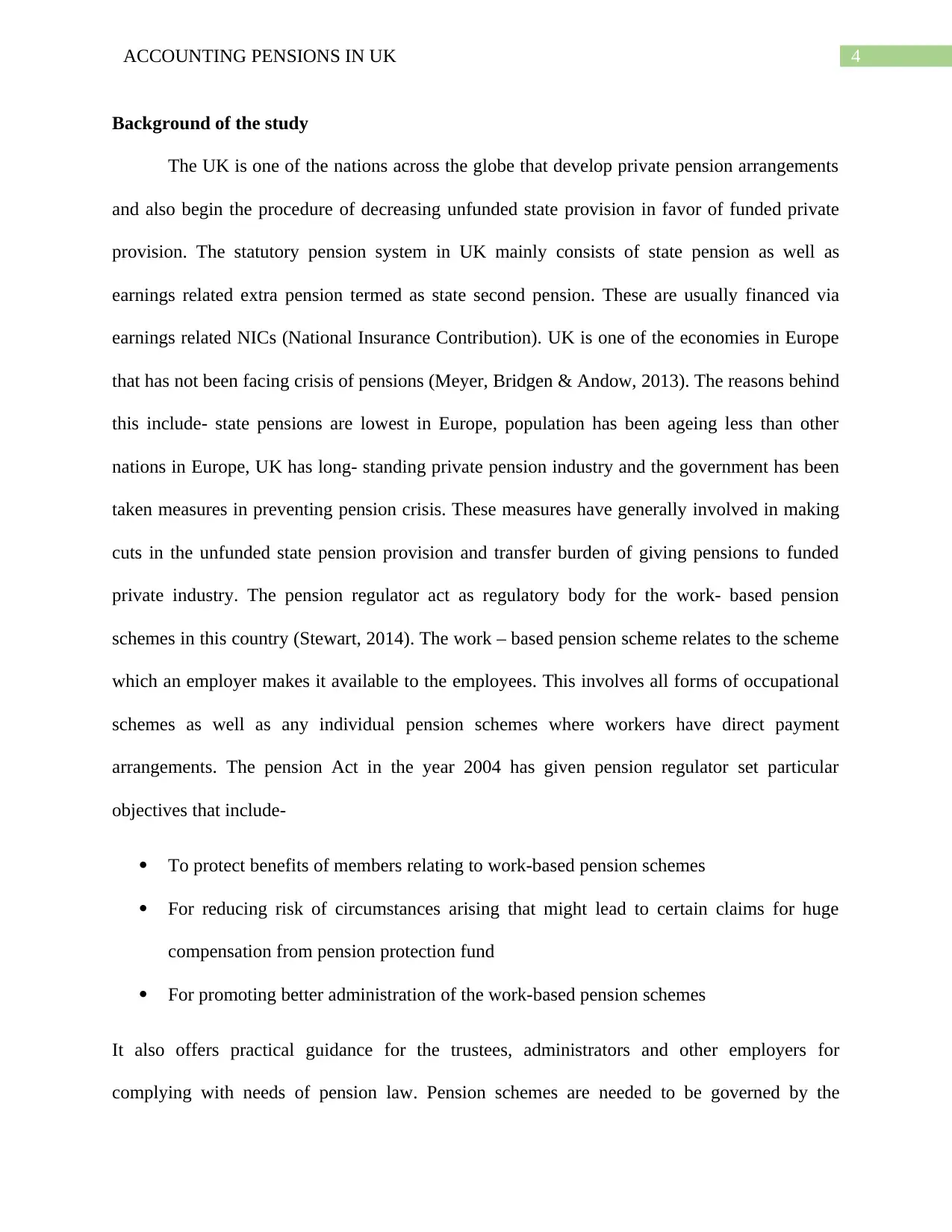
4ACCOUNTING PENSIONS IN UK
Background of the study
The UK is one of the nations across the globe that develop private pension arrangements
and also begin the procedure of decreasing unfunded state provision in favor of funded private
provision. The statutory pension system in UK mainly consists of state pension as well as
earnings related extra pension termed as state second pension. These are usually financed via
earnings related NICs (National Insurance Contribution). UK is one of the economies in Europe
that has not been facing crisis of pensions (Meyer, Bridgen & Andow, 2013). The reasons behind
this include- state pensions are lowest in Europe, population has been ageing less than other
nations in Europe, UK has long- standing private pension industry and the government has been
taken measures in preventing pension crisis. These measures have generally involved in making
cuts in the unfunded state pension provision and transfer burden of giving pensions to funded
private industry. The pension regulator act as regulatory body for the work- based pension
schemes in this country (Stewart, 2014). The work – based pension scheme relates to the scheme
which an employer makes it available to the employees. This involves all forms of occupational
schemes as well as any individual pension schemes where workers have direct payment
arrangements. The pension Act in the year 2004 has given pension regulator set particular
objectives that include-
To protect benefits of members relating to work-based pension schemes
For reducing risk of circumstances arising that might lead to certain claims for huge
compensation from pension protection fund
For promoting better administration of the work-based pension schemes
It also offers practical guidance for the trustees, administrators and other employers for
complying with needs of pension law. Pension schemes are needed to be governed by the
Background of the study
The UK is one of the nations across the globe that develop private pension arrangements
and also begin the procedure of decreasing unfunded state provision in favor of funded private
provision. The statutory pension system in UK mainly consists of state pension as well as
earnings related extra pension termed as state second pension. These are usually financed via
earnings related NICs (National Insurance Contribution). UK is one of the economies in Europe
that has not been facing crisis of pensions (Meyer, Bridgen & Andow, 2013). The reasons behind
this include- state pensions are lowest in Europe, population has been ageing less than other
nations in Europe, UK has long- standing private pension industry and the government has been
taken measures in preventing pension crisis. These measures have generally involved in making
cuts in the unfunded state pension provision and transfer burden of giving pensions to funded
private industry. The pension regulator act as regulatory body for the work- based pension
schemes in this country (Stewart, 2014). The work – based pension scheme relates to the scheme
which an employer makes it available to the employees. This involves all forms of occupational
schemes as well as any individual pension schemes where workers have direct payment
arrangements. The pension Act in the year 2004 has given pension regulator set particular
objectives that include-
To protect benefits of members relating to work-based pension schemes
For reducing risk of circumstances arising that might lead to certain claims for huge
compensation from pension protection fund
For promoting better administration of the work-based pension schemes
It also offers practical guidance for the trustees, administrators and other employers for
complying with needs of pension law. Pension schemes are needed to be governed by the
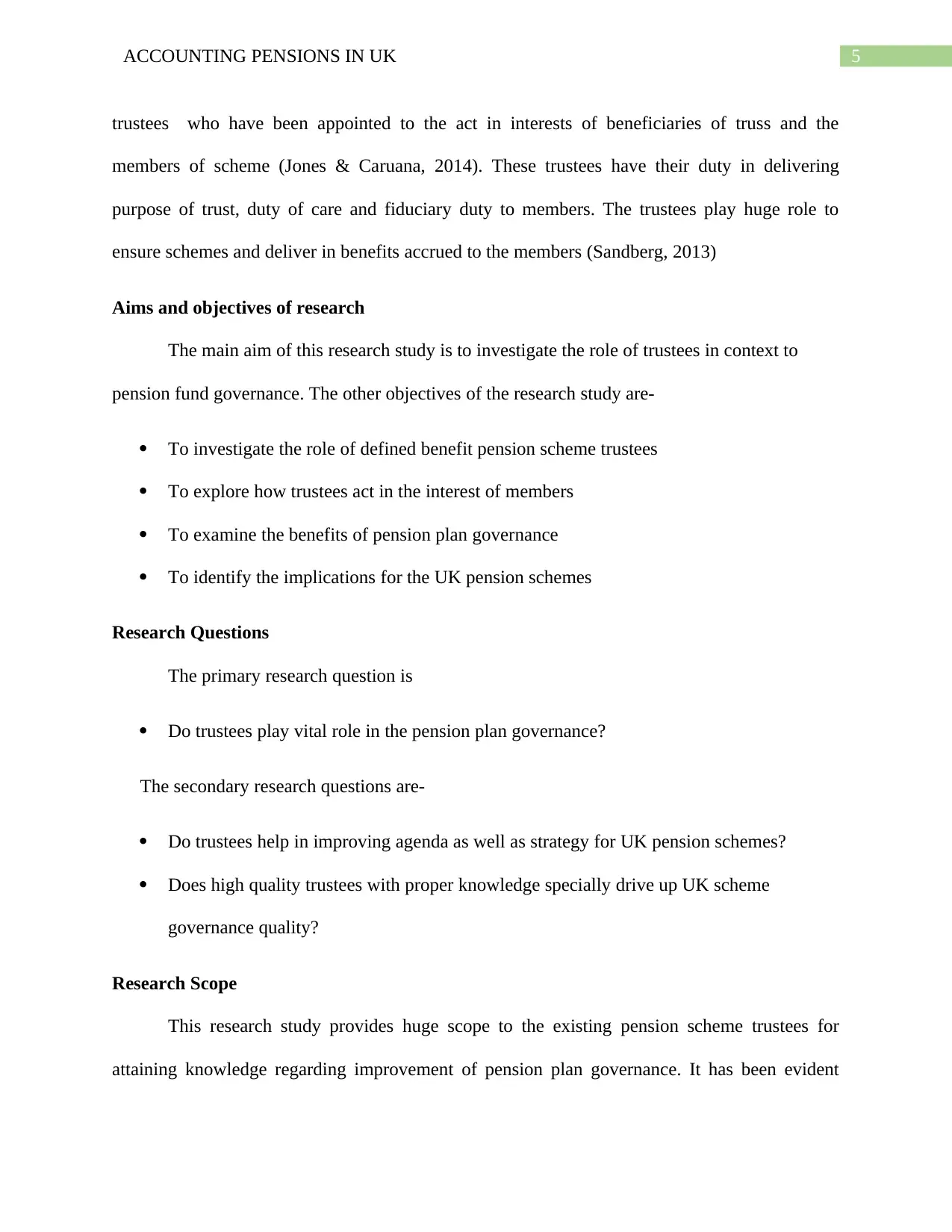
5ACCOUNTING PENSIONS IN UK
trustees who have been appointed to the act in interests of beneficiaries of truss and the
members of scheme (Jones & Caruana, 2014). These trustees have their duty in delivering
purpose of trust, duty of care and fiduciary duty to members. The trustees play huge role to
ensure schemes and deliver in benefits accrued to the members (Sandberg, 2013)
Aims and objectives of research
The main aim of this research study is to investigate the role of trustees in context to
pension fund governance. The other objectives of the research study are-
To investigate the role of defined benefit pension scheme trustees
To explore how trustees act in the interest of members
To examine the benefits of pension plan governance
To identify the implications for the UK pension schemes
Research Questions
The primary research question is
Do trustees play vital role in the pension plan governance?
The secondary research questions are-
Do trustees help in improving agenda as well as strategy for UK pension schemes?
Does high quality trustees with proper knowledge specially drive up UK scheme
governance quality?
Research Scope
This research study provides huge scope to the existing pension scheme trustees for
attaining knowledge regarding improvement of pension plan governance. It has been evident
trustees who have been appointed to the act in interests of beneficiaries of truss and the
members of scheme (Jones & Caruana, 2014). These trustees have their duty in delivering
purpose of trust, duty of care and fiduciary duty to members. The trustees play huge role to
ensure schemes and deliver in benefits accrued to the members (Sandberg, 2013)
Aims and objectives of research
The main aim of this research study is to investigate the role of trustees in context to
pension fund governance. The other objectives of the research study are-
To investigate the role of defined benefit pension scheme trustees
To explore how trustees act in the interest of members
To examine the benefits of pension plan governance
To identify the implications for the UK pension schemes
Research Questions
The primary research question is
Do trustees play vital role in the pension plan governance?
The secondary research questions are-
Do trustees help in improving agenda as well as strategy for UK pension schemes?
Does high quality trustees with proper knowledge specially drive up UK scheme
governance quality?
Research Scope
This research study provides huge scope to the existing pension scheme trustees for
attaining knowledge regarding improvement of pension plan governance. It has been evident
⊘ This is a preview!⊘
Do you want full access?
Subscribe today to unlock all pages.

Trusted by 1+ million students worldwide
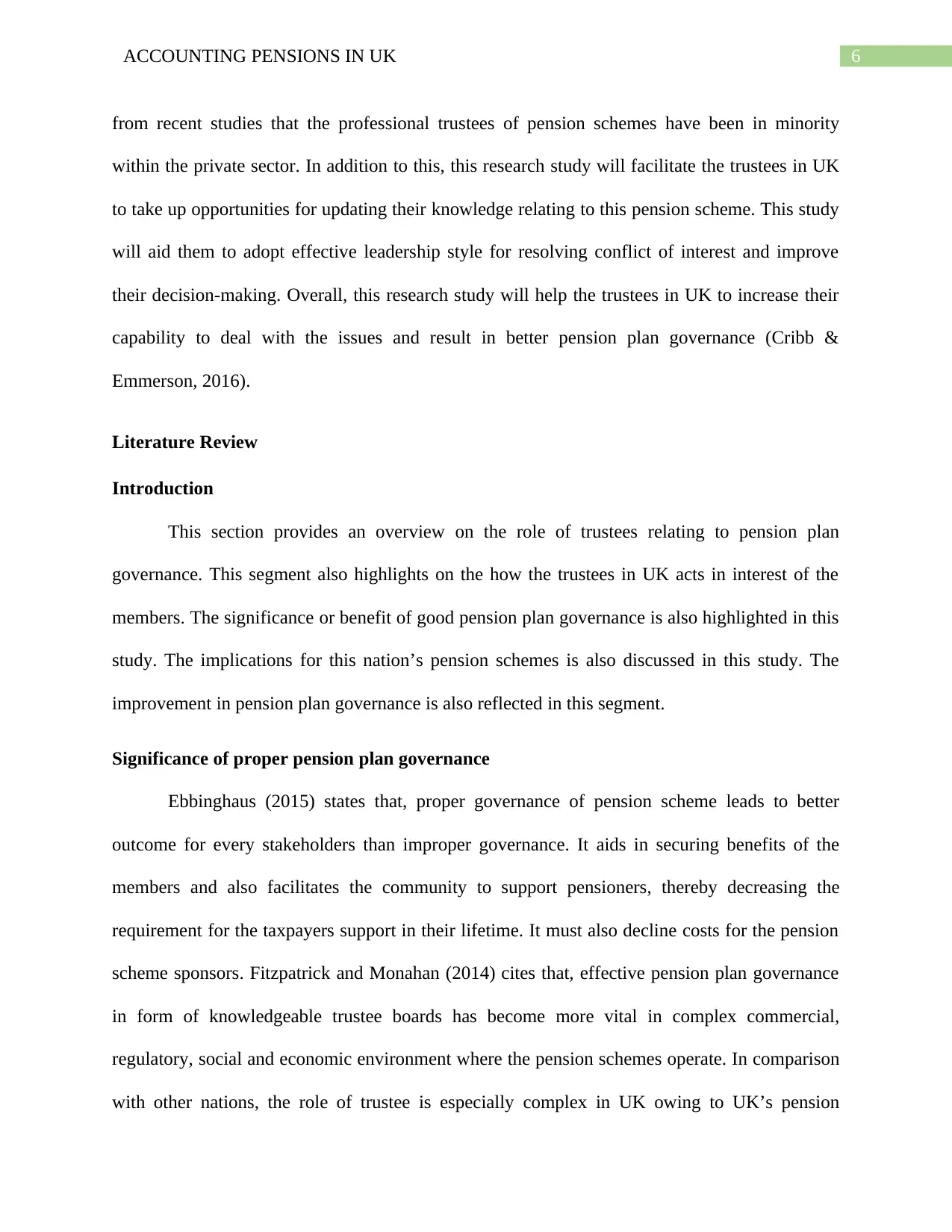
6ACCOUNTING PENSIONS IN UK
from recent studies that the professional trustees of pension schemes have been in minority
within the private sector. In addition to this, this research study will facilitate the trustees in UK
to take up opportunities for updating their knowledge relating to this pension scheme. This study
will aid them to adopt effective leadership style for resolving conflict of interest and improve
their decision-making. Overall, this research study will help the trustees in UK to increase their
capability to deal with the issues and result in better pension plan governance (Cribb &
Emmerson, 2016).
Literature Review
Introduction
This section provides an overview on the role of trustees relating to pension plan
governance. This segment also highlights on the how the trustees in UK acts in interest of the
members. The significance or benefit of good pension plan governance is also highlighted in this
study. The implications for this nation’s pension schemes is also discussed in this study. The
improvement in pension plan governance is also reflected in this segment.
Significance of proper pension plan governance
Ebbinghaus (2015) states that, proper governance of pension scheme leads to better
outcome for every stakeholders than improper governance. It aids in securing benefits of the
members and also facilitates the community to support pensioners, thereby decreasing the
requirement for the taxpayers support in their lifetime. It must also decline costs for the pension
scheme sponsors. Fitzpatrick and Monahan (2014) cites that, effective pension plan governance
in form of knowledgeable trustee boards has become more vital in complex commercial,
regulatory, social and economic environment where the pension schemes operate. In comparison
with other nations, the role of trustee is especially complex in UK owing to UK’s pension
from recent studies that the professional trustees of pension schemes have been in minority
within the private sector. In addition to this, this research study will facilitate the trustees in UK
to take up opportunities for updating their knowledge relating to this pension scheme. This study
will aid them to adopt effective leadership style for resolving conflict of interest and improve
their decision-making. Overall, this research study will help the trustees in UK to increase their
capability to deal with the issues and result in better pension plan governance (Cribb &
Emmerson, 2016).
Literature Review
Introduction
This section provides an overview on the role of trustees relating to pension plan
governance. This segment also highlights on the how the trustees in UK acts in interest of the
members. The significance or benefit of good pension plan governance is also highlighted in this
study. The implications for this nation’s pension schemes is also discussed in this study. The
improvement in pension plan governance is also reflected in this segment.
Significance of proper pension plan governance
Ebbinghaus (2015) states that, proper governance of pension scheme leads to better
outcome for every stakeholders than improper governance. It aids in securing benefits of the
members and also facilitates the community to support pensioners, thereby decreasing the
requirement for the taxpayers support in their lifetime. It must also decline costs for the pension
scheme sponsors. Fitzpatrick and Monahan (2014) cites that, effective pension plan governance
in form of knowledgeable trustee boards has become more vital in complex commercial,
regulatory, social and economic environment where the pension schemes operate. In comparison
with other nations, the role of trustee is especially complex in UK owing to UK’s pension
Paraphrase This Document
Need a fresh take? Get an instant paraphrase of this document with our AI Paraphraser

7ACCOUNTING PENSIONS IN UK
scheme specific funding regime, the need to assess the sponsor covenant as well as complex
structures flowing from the legislation on the matters including- revaluation, GMPs( guaranteed
minimum pensions), indexation and anti- franking. Sandberg (2013) opines that, the closure of
such pension schemes might make governance more complicated.
Sayce & Özbilgin, (2014) suggests that trustees need to have capability of dealing with
complex issues around-
Strength of employer covenant that means having ability to examine strength of
enterprise balance sheet as well as cash position and spotting potential variation in
position, specially if there is any plan for change of control.
Administration of pension scheme as well as quality of data
Actuarial concerns involving funding position of scheme as well as longevity trends
Allocation of asset and investment strategy
The close of private sector schemes to new members and to future accruals has been stimulus
for provision of good governance (Sheppard, 2013). Since the present employees of the scheme
sponsor become highly distanced from direct benefit scheme, it might become difficult to secure
alignment of interest between trustee board and sponsor. This is mainly because funding direct
benefit scheme might lead to huge conflict with investment in the business, improving pay,
maintaining jobs and benefits in direct benefit schemes. Bridging the gap might need huge effort
as well as better governance (Farrelly & Moss, 2014).
Role of trustees in context to pension plan governance
According to Josiah et al. (2014), trustees play vital role in providing better quality trust-
based pensions as well as protecting members benefit. Trustees in the defined benefit as well as
scheme specific funding regime, the need to assess the sponsor covenant as well as complex
structures flowing from the legislation on the matters including- revaluation, GMPs( guaranteed
minimum pensions), indexation and anti- franking. Sandberg (2013) opines that, the closure of
such pension schemes might make governance more complicated.
Sayce & Özbilgin, (2014) suggests that trustees need to have capability of dealing with
complex issues around-
Strength of employer covenant that means having ability to examine strength of
enterprise balance sheet as well as cash position and spotting potential variation in
position, specially if there is any plan for change of control.
Administration of pension scheme as well as quality of data
Actuarial concerns involving funding position of scheme as well as longevity trends
Allocation of asset and investment strategy
The close of private sector schemes to new members and to future accruals has been stimulus
for provision of good governance (Sheppard, 2013). Since the present employees of the scheme
sponsor become highly distanced from direct benefit scheme, it might become difficult to secure
alignment of interest between trustee board and sponsor. This is mainly because funding direct
benefit scheme might lead to huge conflict with investment in the business, improving pay,
maintaining jobs and benefits in direct benefit schemes. Bridging the gap might need huge effort
as well as better governance (Farrelly & Moss, 2014).
Role of trustees in context to pension plan governance
According to Josiah et al. (2014), trustees play vital role in providing better quality trust-
based pensions as well as protecting members benefit. Trustees in the defined benefit as well as
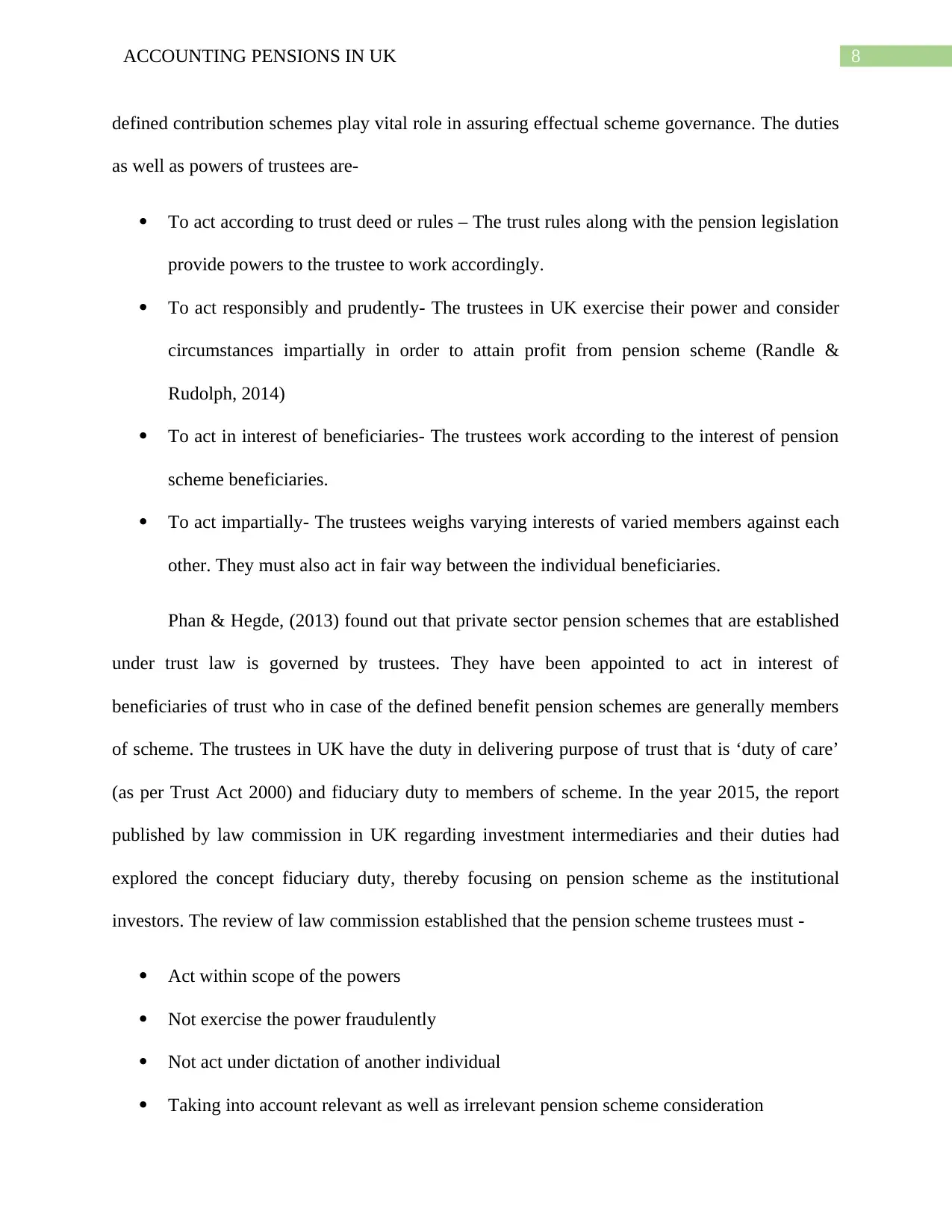
8ACCOUNTING PENSIONS IN UK
defined contribution schemes play vital role in assuring effectual scheme governance. The duties
as well as powers of trustees are-
To act according to trust deed or rules – The trust rules along with the pension legislation
provide powers to the trustee to work accordingly.
To act responsibly and prudently- The trustees in UK exercise their power and consider
circumstances impartially in order to attain profit from pension scheme (Randle &
Rudolph, 2014)
To act in interest of beneficiaries- The trustees work according to the interest of pension
scheme beneficiaries.
To act impartially- The trustees weighs varying interests of varied members against each
other. They must also act in fair way between the individual beneficiaries.
Phan & Hegde, (2013) found out that private sector pension schemes that are established
under trust law is governed by trustees. They have been appointed to act in interest of
beneficiaries of trust who in case of the defined benefit pension schemes are generally members
of scheme. The trustees in UK have the duty in delivering purpose of trust that is ‘duty of care’
(as per Trust Act 2000) and fiduciary duty to members of scheme. In the year 2015, the report
published by law commission in UK regarding investment intermediaries and their duties had
explored the concept fiduciary duty, thereby focusing on pension scheme as the institutional
investors. The review of law commission established that the pension scheme trustees must -
Act within scope of the powers
Not exercise the power fraudulently
Not act under dictation of another individual
Taking into account relevant as well as irrelevant pension scheme consideration
defined contribution schemes play vital role in assuring effectual scheme governance. The duties
as well as powers of trustees are-
To act according to trust deed or rules – The trust rules along with the pension legislation
provide powers to the trustee to work accordingly.
To act responsibly and prudently- The trustees in UK exercise their power and consider
circumstances impartially in order to attain profit from pension scheme (Randle &
Rudolph, 2014)
To act in interest of beneficiaries- The trustees work according to the interest of pension
scheme beneficiaries.
To act impartially- The trustees weighs varying interests of varied members against each
other. They must also act in fair way between the individual beneficiaries.
Phan & Hegde, (2013) found out that private sector pension schemes that are established
under trust law is governed by trustees. They have been appointed to act in interest of
beneficiaries of trust who in case of the defined benefit pension schemes are generally members
of scheme. The trustees in UK have the duty in delivering purpose of trust that is ‘duty of care’
(as per Trust Act 2000) and fiduciary duty to members of scheme. In the year 2015, the report
published by law commission in UK regarding investment intermediaries and their duties had
explored the concept fiduciary duty, thereby focusing on pension scheme as the institutional
investors. The review of law commission established that the pension scheme trustees must -
Act within scope of the powers
Not exercise the power fraudulently
Not act under dictation of another individual
Taking into account relevant as well as irrelevant pension scheme consideration
⊘ This is a preview!⊘
Do you want full access?
Subscribe today to unlock all pages.

Trusted by 1+ million students worldwide
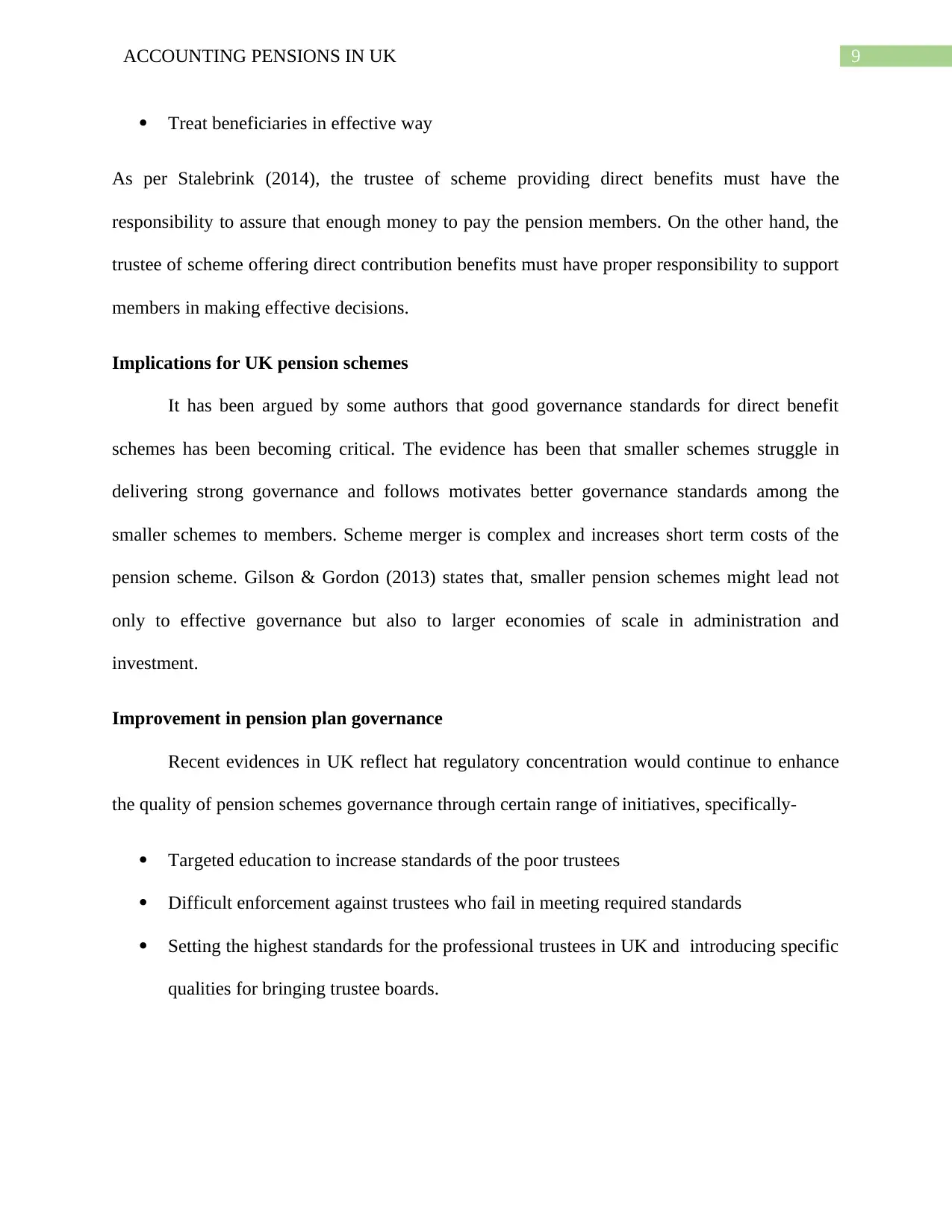
9ACCOUNTING PENSIONS IN UK
Treat beneficiaries in effective way
As per Stalebrink (2014), the trustee of scheme providing direct benefits must have the
responsibility to assure that enough money to pay the pension members. On the other hand, the
trustee of scheme offering direct contribution benefits must have proper responsibility to support
members in making effective decisions.
Implications for UK pension schemes
It has been argued by some authors that good governance standards for direct benefit
schemes has been becoming critical. The evidence has been that smaller schemes struggle in
delivering strong governance and follows motivates better governance standards among the
smaller schemes to members. Scheme merger is complex and increases short term costs of the
pension scheme. Gilson & Gordon (2013) states that, smaller pension schemes might lead not
only to effective governance but also to larger economies of scale in administration and
investment.
Improvement in pension plan governance
Recent evidences in UK reflect hat regulatory concentration would continue to enhance
the quality of pension schemes governance through certain range of initiatives, specifically-
Targeted education to increase standards of the poor trustees
Difficult enforcement against trustees who fail in meeting required standards
Setting the highest standards for the professional trustees in UK and introducing specific
qualities for bringing trustee boards.
Treat beneficiaries in effective way
As per Stalebrink (2014), the trustee of scheme providing direct benefits must have the
responsibility to assure that enough money to pay the pension members. On the other hand, the
trustee of scheme offering direct contribution benefits must have proper responsibility to support
members in making effective decisions.
Implications for UK pension schemes
It has been argued by some authors that good governance standards for direct benefit
schemes has been becoming critical. The evidence has been that smaller schemes struggle in
delivering strong governance and follows motivates better governance standards among the
smaller schemes to members. Scheme merger is complex and increases short term costs of the
pension scheme. Gilson & Gordon (2013) states that, smaller pension schemes might lead not
only to effective governance but also to larger economies of scale in administration and
investment.
Improvement in pension plan governance
Recent evidences in UK reflect hat regulatory concentration would continue to enhance
the quality of pension schemes governance through certain range of initiatives, specifically-
Targeted education to increase standards of the poor trustees
Difficult enforcement against trustees who fail in meeting required standards
Setting the highest standards for the professional trustees in UK and introducing specific
qualities for bringing trustee boards.
Paraphrase This Document
Need a fresh take? Get an instant paraphrase of this document with our AI Paraphraser
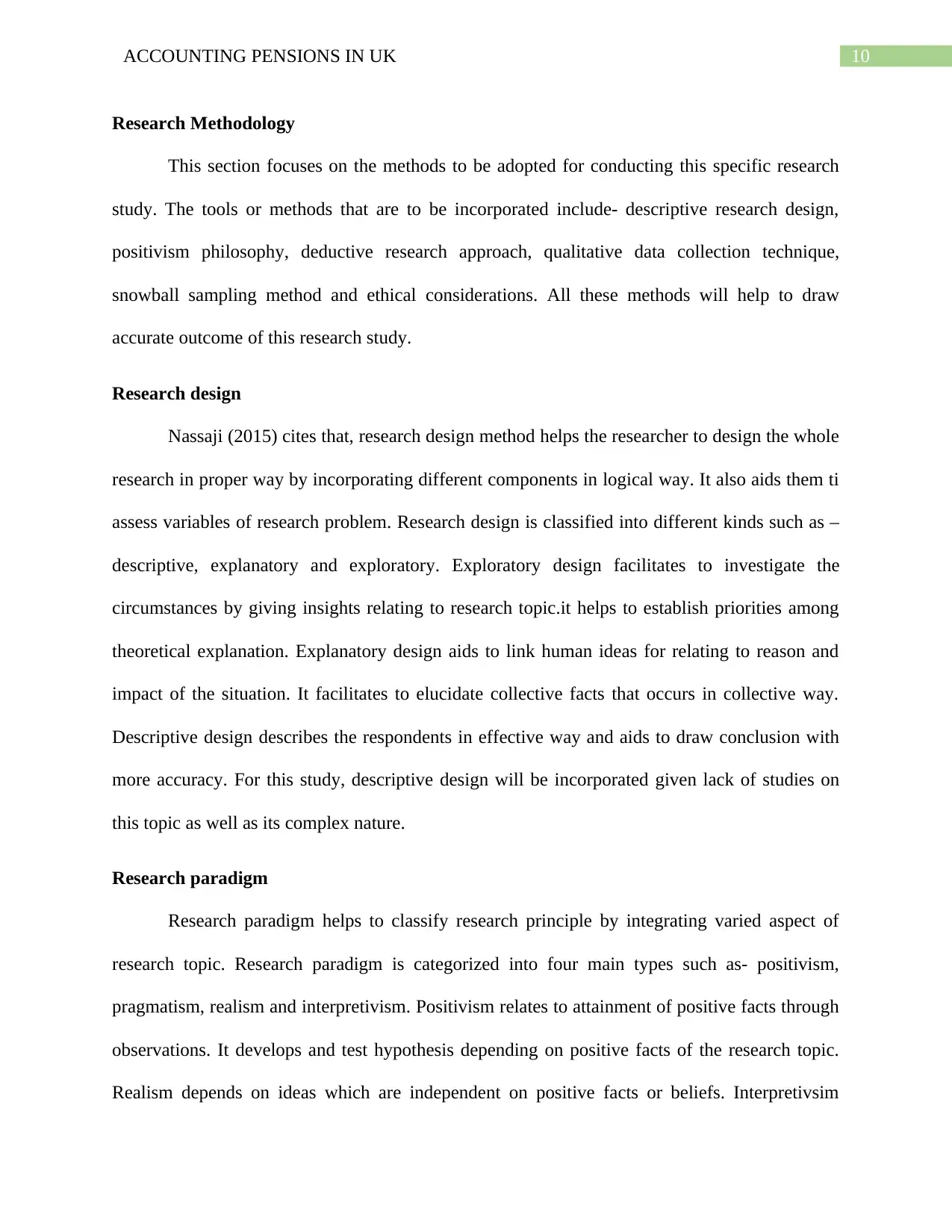
10ACCOUNTING PENSIONS IN UK
Research Methodology
This section focuses on the methods to be adopted for conducting this specific research
study. The tools or methods that are to be incorporated include- descriptive research design,
positivism philosophy, deductive research approach, qualitative data collection technique,
snowball sampling method and ethical considerations. All these methods will help to draw
accurate outcome of this research study.
Research design
Nassaji (2015) cites that, research design method helps the researcher to design the whole
research in proper way by incorporating different components in logical way. It also aids them ti
assess variables of research problem. Research design is classified into different kinds such as –
descriptive, explanatory and exploratory. Exploratory design facilitates to investigate the
circumstances by giving insights relating to research topic.it helps to establish priorities among
theoretical explanation. Explanatory design aids to link human ideas for relating to reason and
impact of the situation. It facilitates to elucidate collective facts that occurs in collective way.
Descriptive design describes the respondents in effective way and aids to draw conclusion with
more accuracy. For this study, descriptive design will be incorporated given lack of studies on
this topic as well as its complex nature.
Research paradigm
Research paradigm helps to classify research principle by integrating varied aspect of
research topic. Research paradigm is categorized into four main types such as- positivism,
pragmatism, realism and interpretivism. Positivism relates to attainment of positive facts through
observations. It develops and test hypothesis depending on positive facts of the research topic.
Realism depends on ideas which are independent on positive facts or beliefs. Interpretivsim
Research Methodology
This section focuses on the methods to be adopted for conducting this specific research
study. The tools or methods that are to be incorporated include- descriptive research design,
positivism philosophy, deductive research approach, qualitative data collection technique,
snowball sampling method and ethical considerations. All these methods will help to draw
accurate outcome of this research study.
Research design
Nassaji (2015) cites that, research design method helps the researcher to design the whole
research in proper way by incorporating different components in logical way. It also aids them ti
assess variables of research problem. Research design is classified into different kinds such as –
descriptive, explanatory and exploratory. Exploratory design facilitates to investigate the
circumstances by giving insights relating to research topic.it helps to establish priorities among
theoretical explanation. Explanatory design aids to link human ideas for relating to reason and
impact of the situation. It facilitates to elucidate collective facts that occurs in collective way.
Descriptive design describes the respondents in effective way and aids to draw conclusion with
more accuracy. For this study, descriptive design will be incorporated given lack of studies on
this topic as well as its complex nature.
Research paradigm
Research paradigm helps to classify research principle by integrating varied aspect of
research topic. Research paradigm is categorized into four main types such as- positivism,
pragmatism, realism and interpretivism. Positivism relates to attainment of positive facts through
observations. It develops and test hypothesis depending on positive facts of the research topic.
Realism depends on ideas which are independent on positive facts or beliefs. Interpretivsim
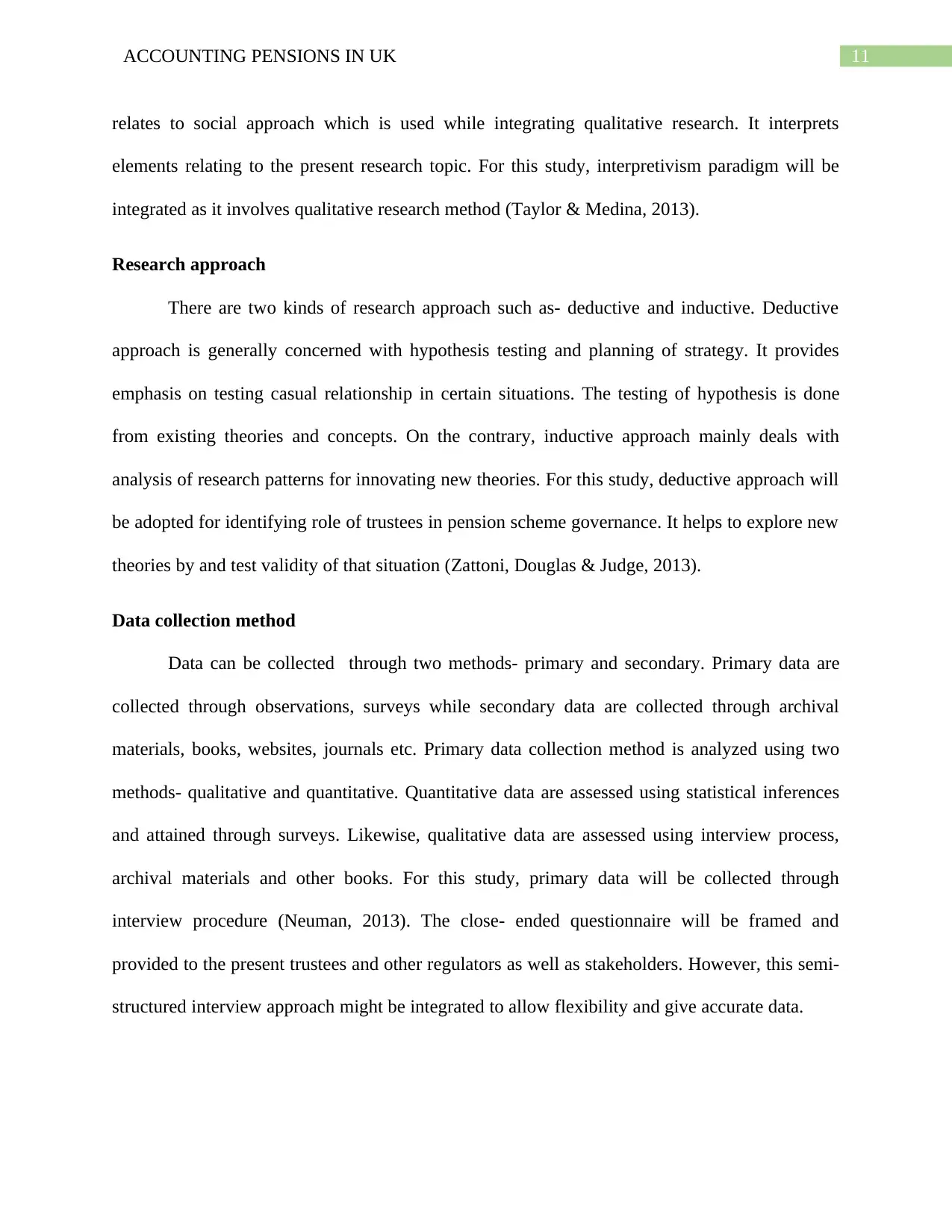
11ACCOUNTING PENSIONS IN UK
relates to social approach which is used while integrating qualitative research. It interprets
elements relating to the present research topic. For this study, interpretivism paradigm will be
integrated as it involves qualitative research method (Taylor & Medina, 2013).
Research approach
There are two kinds of research approach such as- deductive and inductive. Deductive
approach is generally concerned with hypothesis testing and planning of strategy. It provides
emphasis on testing casual relationship in certain situations. The testing of hypothesis is done
from existing theories and concepts. On the contrary, inductive approach mainly deals with
analysis of research patterns for innovating new theories. For this study, deductive approach will
be adopted for identifying role of trustees in pension scheme governance. It helps to explore new
theories by and test validity of that situation (Zattoni, Douglas & Judge, 2013).
Data collection method
Data can be collected through two methods- primary and secondary. Primary data are
collected through observations, surveys while secondary data are collected through archival
materials, books, websites, journals etc. Primary data collection method is analyzed using two
methods- qualitative and quantitative. Quantitative data are assessed using statistical inferences
and attained through surveys. Likewise, qualitative data are assessed using interview process,
archival materials and other books. For this study, primary data will be collected through
interview procedure (Neuman, 2013). The close- ended questionnaire will be framed and
provided to the present trustees and other regulators as well as stakeholders. However, this semi-
structured interview approach might be integrated to allow flexibility and give accurate data.
relates to social approach which is used while integrating qualitative research. It interprets
elements relating to the present research topic. For this study, interpretivism paradigm will be
integrated as it involves qualitative research method (Taylor & Medina, 2013).
Research approach
There are two kinds of research approach such as- deductive and inductive. Deductive
approach is generally concerned with hypothesis testing and planning of strategy. It provides
emphasis on testing casual relationship in certain situations. The testing of hypothesis is done
from existing theories and concepts. On the contrary, inductive approach mainly deals with
analysis of research patterns for innovating new theories. For this study, deductive approach will
be adopted for identifying role of trustees in pension scheme governance. It helps to explore new
theories by and test validity of that situation (Zattoni, Douglas & Judge, 2013).
Data collection method
Data can be collected through two methods- primary and secondary. Primary data are
collected through observations, surveys while secondary data are collected through archival
materials, books, websites, journals etc. Primary data collection method is analyzed using two
methods- qualitative and quantitative. Quantitative data are assessed using statistical inferences
and attained through surveys. Likewise, qualitative data are assessed using interview process,
archival materials and other books. For this study, primary data will be collected through
interview procedure (Neuman, 2013). The close- ended questionnaire will be framed and
provided to the present trustees and other regulators as well as stakeholders. However, this semi-
structured interview approach might be integrated to allow flexibility and give accurate data.
⊘ This is a preview!⊘
Do you want full access?
Subscribe today to unlock all pages.

Trusted by 1+ million students worldwide
1 out of 18
Related Documents
Your All-in-One AI-Powered Toolkit for Academic Success.
+13062052269
info@desklib.com
Available 24*7 on WhatsApp / Email
![[object Object]](/_next/static/media/star-bottom.7253800d.svg)
Unlock your academic potential
Copyright © 2020–2025 A2Z Services. All Rights Reserved. Developed and managed by ZUCOL.





